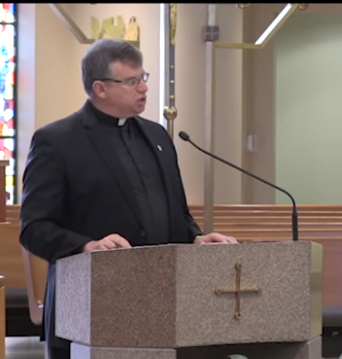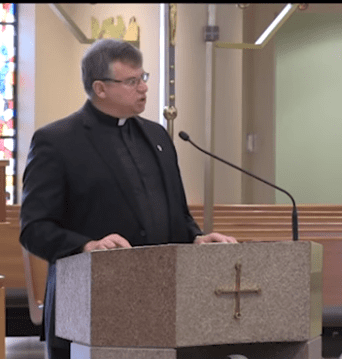Essentials for the inward journey of Lent
 Although part of Fr. Pat Griffin’s series of reflections on Considering Consecrated Life his reflections on “An Inner Journey” and the three essentials: a path, a light, and nourishment is apt for any serious believer. He writes…
Although part of Fr. Pat Griffin’s series of reflections on Considering Consecrated Life his reflections on “An Inner Journey” and the three essentials: a path, a light, and nourishment is apt for any serious believer. He writes…
In the first paragraph of his recent letter, Greg Gay speaks about Lent as “an inward journey.” This phrase directs our attention to some important aspects of these weeks. Lent invites us to an attitude of self-reflection and interior investigation which leads closer to our truest selves. Even the discovery of our weaknesses and pettiness opens up the possibility of growth towards the Lord. We just need to make this interior passage honestly and humbly.
Some elements contribute to making a trip successful. That holds as true for the inner pilgrimage as for the external. This essay will focus our attention on three essentials: a path, a light, and nourishment.
As we know, early Christianity was known as “the way.” We find this term used in the Acts of the Apostles: “[Paul] asked him for letters to the synagogues at Damascus, so that if he found any belonging to the Way, men or women, he might bring them bound to Jerusalem” (Acts 9:2; see 19:9, 23; 24:14, 22). This term probably arose as a result of the connection with Jesus’ reference to himself as “the Way” (Jn 14:6). One of the questions which we can profitably ask ourselves as we travel our intimate itinerary concerns how much we have allowed ourselves to be followers of “the way.” How much have we internalized the words and teachings of the Lord so that our converted mind and heart know the correct road?
Those who have gone along this route before us offer wisdom and encouragement. They help us to find and adhere to the proper trail. When we heed the guidance of Vincent and Louise, they can map for us the course which leads to the Lord according to the markers of our charism. Yet, the exodus must happen within before it can find effective expression without. We need to know the way before we can lead others. Jesus warns us of this truth when he teaches: “Can a blind person guide a blind person? Will not both fall into a pit?” (Lk 6:39). We need to learn to stay on the path despite the diversions and difficulties: “How narrow the gate and constricted the road that leads to life. And those who find it are few” (Mt 7:14). Yet, perseverance and fidelity render an eternal destination.
People appreciate the value of good light for a trip. Traveling on a bright sunny day offers not simply a pleasant but also a straightforward trek. The inner journey demands this tool as well. The Lord provides the illumination for our Lenten pilgrimage. He tells us “I am the light of the world” (Jn 8:12) and “walk while you have the light” (Jn 12:25). The Psalmist recognizes that “[The Lord’s] word is a lamp to my feet and a light to my path” (Ps 119:105) and “The unfolding of your words gives light; it gives understanding to the simple” (119:130).
Each of us possesses attitudes and feelings which hide from the light. Acknowledging them as part of our character causes embarrassment. Sometimes, an unwillingness to confront these limitations stems from the realization that changing them offers too great a challenge. Sometimes we simply do not want to alter them because they express what we truly desire: “For everyone who does wicked things hates the light and does not come toward the light, so that his works might not be exposed” (Jn 3:20). In the inner journey of Lent, as we walk the trail which leads us to serious self-examination, the light must fall across all of our life illuminating the corners, crevices and curves which hide our sin. Only with this radiance can our entire path be clear and our resolution confident.
A final aspect of a successful inner venture presumes the availability of nourishment along the way. We can remember that the Church has used the word “viaticum” figuratively to refer to “food for the journey.” The term came to be applied to the Eucharist as given to someone in danger of death. For the person seeking to draw closer to the Lord during the Lenten Season, this same table provides sustenance. The word, which is proclaimed around the altar, can give strength as well as guidance. In the Bread of Life discourse, Jesus identifies himself:
“I am the bread of life; whoever comes to me will never hunger, and whoever believes in me will never thirst.” (Jn 6:35)
No one can undertake serious travel without making provision for the ongoing subsistence of the body. Similarly, on our spiritual trek, food for the spirit must be considered. Spiritual reading, private and public devotions, penance, corporal discipline and works of mercy can all provide nutrition. Most important, however, is that sustenance which comes from the breaking of the bread of the word and of the altar. These refresh body and soul on the way.
For the inward journey during this Season, the Lord offers us assurances of companionship and support—“I am the way,” “I am the light,” and “I am the bread.” For our Lenten travel, we must recognize how we are lost, confused, and weakened. With awareness of our needs and of the Lord’s gifts, we can make our penitential path surely to a worthy celebration of the Easter mystery.







0 Comments